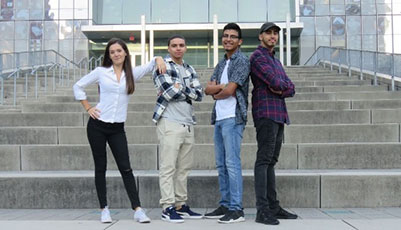
Students looking for a creative home at John Jay College need look no further than the Anthropology Department, where the student collective and magazine known as A Home @ The End of the World will celebrate its one year anniversary this November.
“We started because students wanted to write outside of the academic setting, and without an explicit focus on justice,” said Atiba Rougier, Professor of Anthropology and head of the magazine. “Students were asking: how do I want to engage in the world through my writing?”
“The zine gives me the ability to express myself creatively,” said Connor Gilligan, a founding member of the magazine and sophomore majoring in Anthropology.
Every month, A Home @ The End of the World publishes articles from “zinesters” on topics that include everything from history and literature to health and happiness. Before publication, articles are reviewed by an Executive Editorial Board that includes several John Jay faculty, including President of the American Anthropological Association Alisse Waterston.
“A Home @ The End of the World gives students space to write, but it’s also a way for students to learn things like meeting deadlines and expressing themselves in an article,” said Rougier. “That’s important for a career.”
In addition to building professional skills, senior Joey Butts says the magazine builds community: “The zine has given me a family at John Jay.”
That emphasis on community is why A Home @ The End of the World also hosts a monthly discussion series called the Anthropology Café, where students can come together to learn how anthropology can help them find solutions to real-world problems.
“Take the topic of drug addiction,” said Kevin Garcia, a freshman studying English. “Anthropology helps us see it as more than a disease and understand its cultural aspects as well.”
The next Anthropology Café will be on Domestic Violence Awareness Day on October 19, and will be led by Dr. Edward Snajdr on gender-based violence in Asia. Like every event the magazine hosts, it is open to all students, regardless of what they’re studying.
“A cop that has taken anthropology is a different cop than one who hasn’t,” said Rougier.
Irene Agyemang, a Criminal Justice major, agrees. “Anthropology allows me to see the world from other points of view and therefore teaches me tolerance,” she said. “We need tolerance, especially in this political climate.”
Other students see anthropology’s potential to impact their careers in different ways.
“I plan to go to medical school and use what I learned in anthropology to work for Doctors Without Borders,” said Dafhnee Jimenez, a junior who majors in Anthropology and minors in Biology.
In the same way that A Home @ The End of the World welcomes students with various career goals, it also welcomes students with various creative abilities, not just writing.
Michelle Bukhari became a photographer for the zine after her sister Amerra recommended she join. “Now, I have a place to display my work,” she said.
Students can also help manage the zine’s robust Instagram presence. This month, Philosophy student Debbie Chan will be working with Sarah Morgano, Social Media Manager for the college, to plan a @AHomeAtTheEndoftheWorld week-long takeover of the College’s official Instagram account.
“The zine allows me to meet people I would’ve never had the chance to meet before,” Chan said of her work with Morgano.
The takeover, which starts October 16th, will bring greater awareness of anthropology to the John Jay community as well as the opportunities offered by the Department. For example, a group of students will be traveling to DC this December for the American Anthropological Association’s annual conference. Next March, A Home @ The End of the World will also host its second annual conference featuring student and faculty work.
Freshman Frank Davila is grateful he was introduced to the zine. “I love this group,” he said. “The more we know about different cultures, the more we’ll be able to get along.”



